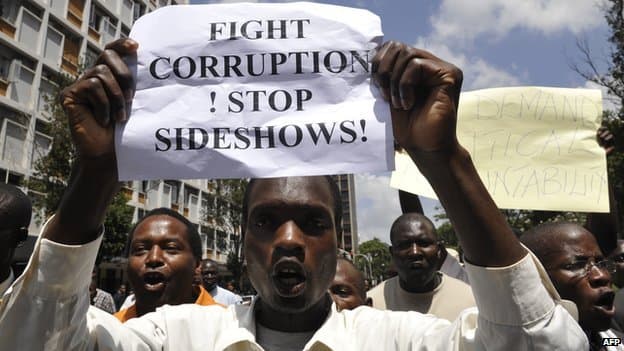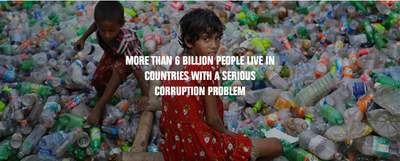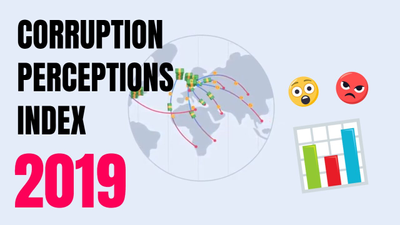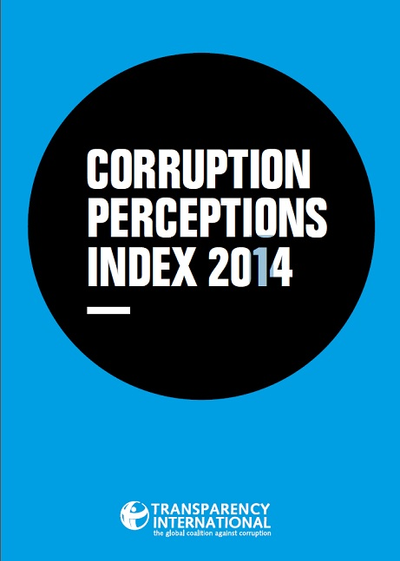First published in September, 2014 by the Editor, Business Day.
At least $1 trillion is being taken out of poor countries every year through shady deals for natural resources, the use of shell companies, money laundering and illegal tax evasion, a campaign group said on Wednesday.
The ONE Campaign, co-founded by Irish rocker Bono to end extreme poverty and disease, said curbing corruption in sub-Saharan Africa could provide money to educate an extra 10 million children a year.
Money recovered from corrupt activity could pay the salaries of an additional 500,000 primary school teachers in Africa, provide antiretroviral drugs for more than 11 million people living with HIV and fund nearly 165 million vaccine shots, it said.
“In developing countries, corruption is a killer. Up to 3.6 million lives could be saved if we end the web of secrecy that helps the criminal and corrupt,” said ONE’s David McNair, author of the report “The Trillion Dollar Scandal.”
“When governments are deprived of their own resources to invest in the essentials – like nurses and teachers – the human cost is devastating,” he said in a statement.
McNair told Thomson Reuters Foundation that ONE looked at three sets of numbers to arrive at the $1 trillion figure: Global Financial Integrity’s work on the scale of illicit financial flows, the U.N. Office on Drugs and Crime on money laundering and estimates by Christian Aid and others of tax revenues lost as a result of trade mispricing.
ONE released the report ahead of a summit of the 20 richest countries (G20) in Australia in November, where it plans to lobby the group to do more to tackle corruption and “the uncomfortable truth” that money diverted from poor countries’ budgets often ends up in G20 countries and their jurisdictions.
The report estimates that worldwide $20 trillion of undeclared assets are held offshore – $3.2 trillion of it originating from developing countries.
It said anonymous shell companies were involved in 70 percent of the more than 200 biggest corruption cases between 1980 and 2010, and called on G20 leaders to “shine a light” on phantom firms.
It also urged G20 countries to introduce mandatory reporting laws for the oil, gas and mining sectors; crack down on tax evasion; and publish data so that citizens can hold their governments to account.
Natural resource exports from Africa increased fivefold between 2002 and 2012, ONE said. In 2012, exports of oil and minerals from Africa were worth $438 billion – nearly eight times the value of agricultural exports and more than nine times the value of international aid.
Earlier this year, Global Financial Integrity said fraudulent trade invoicing in five African countries – Ghana, Kenya, Mozambique, Tanzania and Uganda – cheated taxpayers out of a combined $14.4 billion in revenue in the 10 years to 2011.
Illegal tax evasion is one of the main reasons for trade mispricing, where the value of imports or exports is over or under-valued, ONE said.
The ONE Campaign is not the only advocacy group to target the G20 meeting. Transparency International launched an “unmask the corrupt” campaign in June, saying the G20 must make it harder for the corrupt to hide behind secret companies.
At least $1 trillion is being taken out of poor countries every year through shady deals for natural resources, the use of shell companies, money laundering and illegal tax evasion, a campaign group said on Wednesday.
The ONE Campaign, co-founded by Irish rocker Bono to end extreme poverty and disease, said curbing corruption in sub-Saharan Africa could provide money to educate an extra 10 million children a year.
Money recovered from corrupt activity could pay the salaries of an additional 500,000 primary school teachers in Africa, provide antiretroviral drugs for more than 11 million people living with HIV and fund nearly 165 million vaccine shots, it said.
“In developing countries, corruption is a killer. Up to 3.6 million lives could be saved if we end the web of secrecy that helps the criminal and corrupt,” said ONE’s David McNair, author of the report “The Trillion Dollar Scandal.”
“When governments are deprived of their own resources to invest in the essentials – like nurses and teachers – the human cost is devastating,” he said in a statement.
McNair told Thomson Reuters Foundation that ONE looked at three sets of numbers to arrive at the $1 trillion figure: Global Financial Integrity’s work on the scale of illicit financial flows, the U.N. Office on Drugs and Crime on money laundering and estimates by Christian Aid and others of tax revenues lost as a result of trade mispricing.
ONE released the report ahead of a summit of the 20 richest countries (G20) in Australia in November, where it plans to lobby the group to do more to tackle corruption and “the uncomfortable truth” that money diverted from poor countries’ budgets often ends up in G20 countries and their jurisdictions.
The report estimates that worldwide $20 trillion of undeclared assets are held offshore – $3.2 trillion of it originating from developing countries.
It said anonymous shell companies were involved in 70 percent of the more than 200 biggest corruption cases between 1980 and 2010, and called on G20 leaders to “shine a light” on phantom firms.
It also urged G20 countries to introduce mandatory reporting laws for the oil, gas and mining sectors; crack down on tax evasion; and publish data so that citizens can hold their governments to account.
Natural resource exports from Africa increased fivefold between 2002 and 2012, ONE said. In 2012, exports of oil and minerals from Africa were worth $438 billion – nearly eight times the value of agricultural exports and more than nine times the value of international aid.
Earlier this year, Global Financial Integrity said fraudulent trade invoicing in five African countries – Ghana, Kenya, Mozambique, Tanzania and Uganda – cheated taxpayers out of a combined $14.4 billion in revenue in the 10 years to 2011.
Illegal tax evasion is one of the main reasons for trade mispricing, where the value of imports or exports is over or under-valued, ONE said.
The ONE Campaign is not the only advocacy group to target the G20 meeting. Transparency International launched an “unmask the corrupt” campaign in June, saying the G20 must make it harder for the corrupt to hide behind secret companies.
At least $1 trillion is being taken out of poor countries every year through shady deals for natural resources, the use of shell companies, money laundering and illegal tax evasion, a campaign group said on Wednesday.
The ONE Campaign, co-founded by Irish rocker Bono to end extreme poverty and disease, said curbing corruption in sub-Saharan Africa could provide money to educate an extra 10 million children a year.
Money recovered from corrupt activity could pay the salaries of an additional 500,000 primary school teachers in Africa, provide antiretroviral drugs for more than 11 million people living with HIV and fund nearly 165 million vaccine shots, it said.
“In developing countries, corruption is a killer. Up to 3.6 million lives could be saved if we end the web of secrecy that helps the criminal and corrupt,” said ONE’s David McNair, author of the report “The Trillion Dollar Scandal.”
“When governments are deprived of their own resources to invest in the essentials – like nurses and teachers – the human cost is devastating,” he said in a statement.
McNair told Thomson Reuters Foundation that ONE looked at three sets of numbers to arrive at the $1 trillion figure: Global Financial Integrity’s work on the scale of illicit financial flows, the U.N. Office on Drugs and Crime on money laundering and estimates by Christian Aid and others of tax revenues lost as a result of trade mispricing.
ONE released the report ahead of a summit of the 20 richest countries (G20) in Australia in November, where it plans to lobby the group to do more to tackle corruption and “the uncomfortable truth” that money diverted from poor countries’ budgets often ends up in G20 countries and their jurisdictions.
The report estimates that worldwide $20 trillion of undeclared assets are held offshore – $3.2 trillion of it originating from developing countries.
It said anonymous shell companies were involved in 70 percent of the more than 200 biggest corruption cases between 1980 and 2010, and called on G20 leaders to “shine a light” on phantom firms.
It also urged G20 countries to introduce mandatory reporting laws for the oil, gas and mining sectors; crack down on tax evasion; and publish data so that citizens can hold their governments to account.
Natural resource exports from Africa increased fivefold between 2002 and 2012, ONE said. In 2012, exports of oil and minerals from Africa were worth $438 billion – nearly eight times the value of agricultural exports and more than nine times the value of international aid.
Earlier this year, Global Financial Integrity said fraudulent trade invoicing in five African countries – Ghana, Kenya, Mozambique, Tanzania and Uganda – cheated taxpayers out of a combined $14.4 billion in revenue in the 10 years to 2011.
Illegal tax evasion is one of the main reasons for trade mispricing, where the value of imports or exports is over or under-valued, ONE said.
The ONE Campaign is not the only advocacy group to target the G20 meeting. Transparency International launched an “unmask the corrupt” campaign in June, saying the G20 must make it harder for the corrupt to hide behind secret companies





